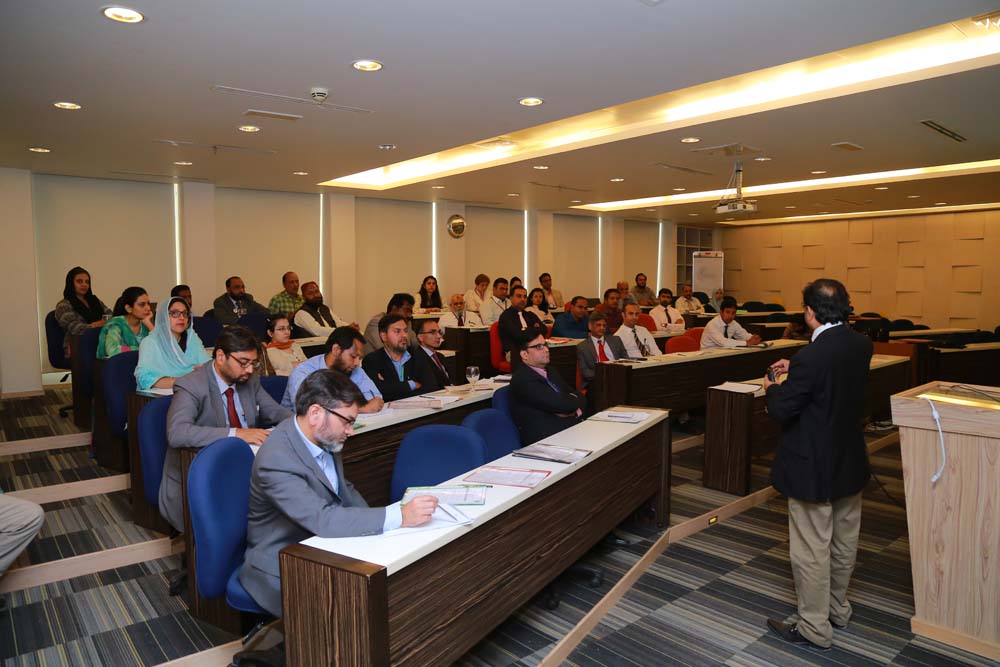Identification and Prioritization of Critical Issues and Challenges in Promoting the True Quality Culture in Higher Education Institutions
The concept of quality in higher education has always been a debatable subject. It has always been considered as one of the major pillars of all ongoing massive development whether it be the expansion of infrastructure or expansion of academic programs. The demands of the ever growing number of students pursuing higher education and the demands and expectations of the job industry has increased largely towards institutions to set up and maintain the highest levels of educational quality but the issues and obstacles faced by the higher education providers in implementation of the true quality culture has become a big challenge. To address these critical areas, Quality Enhancement Cell of IBA Karachi organized a seminar on " Identification and Prioritization of Critical Issues and Challenges in Promoting the True Quality Culture in Higher Education Institutions" followed by a panel discussion.
The renowned keynote speakers and experts from academia were invited to share their expertise with the audience helping them attain the academic excellence by setting clear cut strategic direction.
Prof. Dr. Mustaghis-ur-Rahman, Head of Management Sciences Department, Bahria University in his speech discussed various different Quality Cultures like Responsive (Something developing around the world and how we respond to that), Reactive (it will lead to regenerative quality culture and it can be done by Top management) , Regenerative and Reproductive (maintenance of status quo) quality cultures. He emphasized to have REGENERATIVE Quality Culture ( LEARNING ORGANISATION) rather than Reactive Quality Culture. because Quality is a strategic issue and not the management issue and the top management should take quality as a strategic issue.He also maintained that we should buy the Aristotle definition of Quality. ‘IT IS NOT AN ACTION BUT A HABBIT’. Organizations should inculcate the habit of quality and need to learn and teach quality habits. Excellence should be Institute-wide and no corner should be left in dark. By cooperating together Institutes can share and multiply their resources.
Dr Zaki Rashdi, Director Quality, Learning & Innovation Associate Dean (Accreditation) Iqra University, highlighted the relative nature of the concept of Quality. He asserted that the Quality culture is not tangible, but it is something which can only be felt and learned while you are exposed to different quality systems. He maintained that the Quality in education is always associated with teaching, learning and its processes so the Teaching & Learning should be the focus for Quality. He also talked about the Quality Octate comprising the 8 important parameters with 'Institutional Leadership' on top because our leaders are not exposed to that quality parameters. Answering a question asked during the panel discussion, Dr Zaki recommended that as critical thinking is missing in our teaching & learning practice, there is need to use Socartis type of questioning. We need to measure Programs objective & Outcome and inculcate the open
system thinking and giving students and all stake holders a Voice on Quality.
There were other renowned names among the panelists like Engr. Javed Ali Memon, Director HEC, Regional Centre, Karachi, Dr. Faryal Salman, Associate Professor & HoD, Management Sciences & Humanities, DHA, Suffa University, Dr. Asif Shaikh, Director QEC, NED University, .Dr. Kamran Mumtaz, Head of Management Sciences Dept. IBA, Dr. Ashar Saleem, Assistant Prof. Management Dept. IBA and Dr. Shahid Mir, Director, QEC IBA (Moderator).
The seminar was attended by a large number of QECs, Faculty members and management personnel from different leading universities of Karachi, Nawabsha, Sindh and Balochistan. Whereas, universities in other cities connected the session via HEC video conferencing and HEC web TV.
Finally, Dr Nishat, Associate Dean, Faculty of Business Administration, IBA & Vice Chairman Accreditation Council, in his closing remarks, recommended that the Graduate Employability Index should be taken as a Quality Index and it should be used as a criteria for ranking by HEC. He extended the vote of thanks and appreciated the efforts of the QEC team to organize such a wonderful seminar and provide the audience a very enriching, learning experience. In the end, he distributed souvenirs among the speakers and panelists and certificates among the participants.
